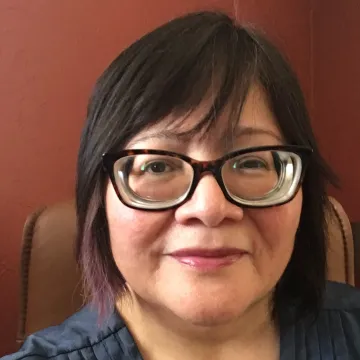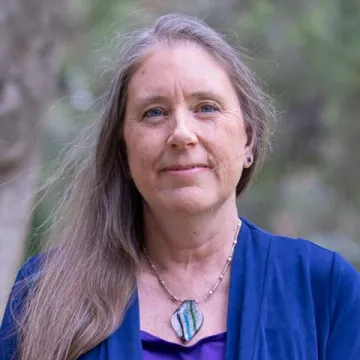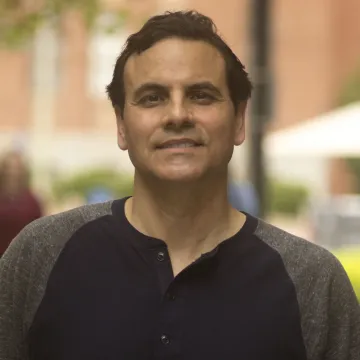Wanda Alarcón, PhD | Gender and Women's Studies | College of Social & Behavioral Sciences
Amplifying Chicana Soundscapes: Tuning into Gloria Anzaldúa ́s Borderlands/La Frontera

This project is a re-reading and “un airing” of the sounds, noises, songs, and soundtracks embedded in Anzaldua’s Borderlands through the concept of the soundscape. Through an examination of Anzaldua’s primary archival materials held at the Benson Library Latin American Collection at the University of Texas and the continued support of the Latinx Soundscapes Research Working Group, Dr. Alarcón will use listening and sound as a methodology for interpreting and amplifying diverse cultural and border social texts that are integral for understanding Chicana worlds. Beyond the method of the soundscape, Dr. Alarcon argues that listening is an important decolonial feminist listening practice. The portability of her concept is important for Chicanas reading Anzaldúa from their own complex and contradictory borderlands. Because the geographic U.S.-Mexico borderlands are overdetermined as a site of violence and death for Chicana, Mexicana, and indigenous women, engaging the borderlands philosophically, metaphorically, and sonically is crucial for understanding the multiple ways border-dwellers navigate this liminal space in life-affirming ways. Sounding the borderlands/Borderlands further activates the notion of resonance, reverberation, echo, and noise as key tools for investigating our lived realities.
Dr. Wanda Alarcón is an assistant professor at the Gender and Women's Studies department. Dr. Alarcón is an interdisciplinary scholar specializing in Chicana literature, music, and decolonial feminist thought. Dr. Alarcón received her Ph.D. in Ethnic Studies with a Designated Emphasis on Women, Gender, and Sexuality from UC Berkeley and was a Carlos E. Castañeda Postdoctoral Fellow at the Center for Mexican American Studies at UT Austin. Her research investigates ways of listening to a field of multiple resistant sounds that signal the enduring presence of Mexican and Latinx communities in the U.S. that shape the contested soundscape of América. In particular, Dr. Alarcón focuses on Chicana soundscapes and decolonial feminist listening practices. Dr. Alarcón's current book project titled “Chicana Sonics and the Decolonial Politics of Listening” examines the writings of four contemporary Chicana authors whose collective works amplify how we hear gender and jotería through the concept of the soundscape. She is interested in the way diverse forms of writing, such as poetry, stories, memoir, song, and drama, remember and highlight East Los Angeles and the 1980s as important sites for seeing and hearing new Chicana representations and sonic worlds. In many ways, the work Dr. Alarcón does now retains the spirit of the Chicana lesbian poetry zine JOTA she created in 2002. This early project was sparked by her desire to see and read more Chicana stories, collaborate with friends, and cultivate a lively literary community in her hometown of Los Angeles. Dr. Alarcón brings this experience into her teaching and often asks students to make their own creativity and collaboration part of their learning. As a first-generation Chicana scholar, Dr. Alarcón is committed to mentoring first-generation working class students of color to demystify academic writing and cultivate their own voices.
Elizabeth Oglesby, PhD & Alejandro Nava, PhD | Latin American Studies & Religious Studies | College of Social & Behavioral Sciences and College of Humanities
Asylum and Humanitarianism Along the Arizona Border


The project examines how southern Arizona communities of faith, non-profit organizations, local and county officials, as well as a wide swath of individual volunteers, have responded to the rapid increase in asylum seekers crossing the U.S.-Mexico border after 2014, especially since 2018. Doctors Oglesby and Nava propose a collaborative project with Casa Alitas, southern Arizona’s largest migrant respite center, to document the stories of this community mobilization over the past decade. Oglesby and Nava will also go beyond Casa Alitas to include the experiences of other shelter spaces in Tucson and along the border. They focus on the experiences of those who have mobilized to provide care: How have changes along the border in the past years reshaped humanitarian action, and how has this, in turn, contributed to processes of community building in our region? We propose artistic and pedagogical means of dissemination of this research, as well as scholarly articles and essays.
Dr. Alejandro Nava is a professor of Religious Studies. He was born and raised in Tucson. His books include The Mystical and Prophetic Thought of Simone Weil and Gustavo Gutiérrez; Wonder and Exile in the New World; In Search of Soul; and, most recently, Street Scriptures: Between God and Hip-Hop (University of Chicago Press, 2022), which won the 2023 award in African-American popular culture studies from the Popular Culture Association. He has written extensively on religion, culture, and border issues for media outlets such as The Los Angeles Review of Books, The American Scholar, America Magazine, Commonweal, and Sojourners.
Dr. Elizabeth Oglesby is an Associate Professor of Latin American Studies and Geography. She has researched forced displacement in Central America since the 1980s, working with Guatemalan researchers, and she was an expert witness in the Guatemalan genocide trials in 2013 and 2018. She is co-editor of The Guatemala Reader (Duke University Press, 2011); Guatemala: The Question of Genocide (Routledge, 2018); and El juicio histórico (Editorial Cholsamaj, Guatemala, in press). She has written about Central American migration and the border for The Hill, The Conversation, Salon, The Nation, and other venues.

